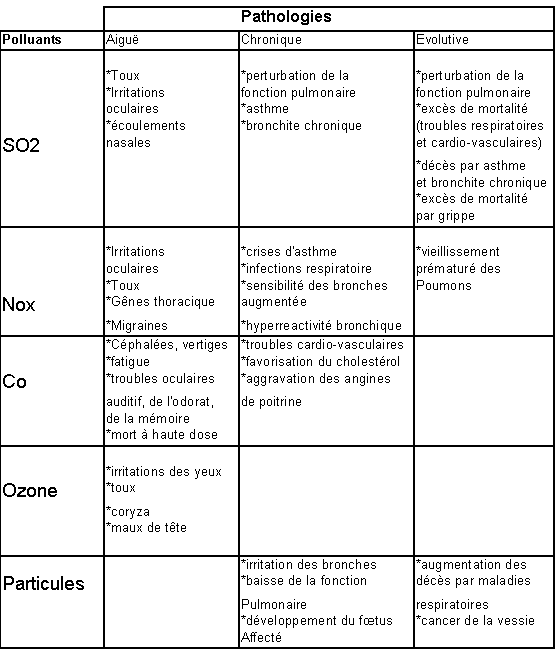Pollution from oil and fossil fuels.
The combustion of oil as we know it today poses serious environmental problems, because it releases into the atmosphere, in large quantities, products that are harmful to the ecosystem and to the planet. The planet's “absorption” capacities have been exceeded since the beginning of the 90s and the latest disturbances, some speak of climatic changes, testify to the malaise of our planet.
Some scientists, in the minority, formulate "cyclical" or external explanations; this while the link between pollutants and the greenhouse effect is clearly established. Even if the one between natural disasters and the greenhouse effect remains to be proven, common sense is enough to see that the favorable balance for life (extremely rare in the Universe) of our planet is dangerously disrupted.
Today it is all this global balance which is threatened by polluting fossil fuels which reject into the atmosphere the products that the earth had absorbed for millions of years. Indeed, fossil fuels constitute the natural reserve of carbon buried in the ground, and as such, it is the carbon memory of the earth. It took 400 million years for the Earth to create these oil reserves and less than 200 years for humans to exhaust them, that is to say instantly on a geological scale.
These gaseous emissions directly pollute the man who breathes them and indirectly the planet; with, in both cases, extremely serious consequences already perceptible and whose importance can, unfortunately, only worsen given the current evolution. This with considerable medico-social costs. In the case of France, these costs will amount to thousands of times the credits allocated to pollution control and new energy research.
Direct pollution: example of the Strasbourg conurbation (see comprehensive study on new urban transport )
Urban centers bring together the bulk of human activity and population in developed countries. The development (demographic and economic) of these urban centers induces an ever higher energy need. We will limit ourselves to the example of transport to translate this congestion, spatial and environmental, of cities.
According to surveys carried out by the authorities, in the month of July 2000, there are approximately 2 million km. vehicle traveled per day in the Strasbourg area. This represents the equivalent of 5 fuel tankers consumed per day and the following quantities of pollutants:
| pollutant | CO | CO2 | Nox | unburned | particles |
| Quantity in tons | 1.907 | 267.037 | 0.724 | 0.297 | 0.054 |
These quantities were calculated according to the emissions in g / km of a Renault Clio (Diesel and gasoline) model 1999 having traveled 3000 km and on the basis of a vehicle fleet made up of 50% Diesel vehicles and 50% vehicles gasoline.
According to the preventive cost on CO2, (see Estimation of the cost of CO2 pollution), the 270 tonnes per day represent a virtual preventive cost of enon 50 frs per day, or about 000 million frs per year.
If the efforts of manufacturers and oil tankers over the past 10 years have made it possible to significantly reduce the quantity of sulfur oxides (80% reduction) and lead (95% reduction) in the air of cities, we let us see, by these figures, that the air of the cities is still strongly saturated, and the constant increase of the automobile park does not help anything. However, many technological solutions exist or are in development to decongest the air and space of cities.
Direct consequences of pollutants from the combustion of fossil fuels on humans. Click to enlarge
Numerous studies have been carried out by various hospitals and medical establishments on the health consequences of chronic exposure to various pollutants. The results of these studies are obviously not disseminated to the general public for obvious reasons, but what is now certain is that in cities pollution kills more than accidents: in the Strasbourg metropolitan area, per year, there are for the year 2000 around 500 premature deaths due to pollution, ie double the number of (direct) victims by accidents. Obviously, it is the weakest people (young children, the elderly, people with asthma) who are affected first. But today no one can estimate the influence of chronic urban pollution on the lifespan of populations.

